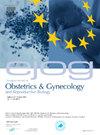Studying medicine – Does it influence the choice of contraceptive method?
IF 1.9
4区 医学
Q2 OBSTETRICS & GYNECOLOGY
European journal of obstetrics, gynecology, and reproductive biology
Pub Date : 2025-10-01
DOI:10.1016/j.ejogrb.2025.114748
引用次数: 0
Abstract
Introduction
Choosing a contraceptive method is an important aspect of sexual life. However, it can be a difficult decision due to insufficient knowledge about the physiology of the menstrual cycle and different methods of contraception. This raises the question of whether female medical students, who should have greater knowledge in this area, choose different contraceptive methods compared with non-medical students.
Aim
To examine contraceptive preferences in female students, and establish whether their field of study affects these preferences.
Materials and methods
This study included 414 female students: 189 from non-medical faculties, 122 from medical and dental faculties, and 103 from other medical faculties. The inclusion criteria for the study were: female gender; age ≥18 years; student status; informed consent to participate in the study; and completion of the questionnaire. Failure to meet any of the inclusion criteria resulted in exclusion from the study. Data were obtained through an anonymous survey created on the Google Forms platform, consisting of 16 questions. The questionnaire was distributed to potential female respondents via social media, and was open from 3 October 2023 to 3 December 2023.
Results
Barrier methods of contraception were used most commonly [264 respondents (63.78 %)], regardless of field of study, and the least commonly used method of contraception, chosen by only three respondents (0.72 %), was the hormone-free intrauterine device. When divided into three groups according to field of study, as in the survey, no significant correlation was found between field of study and preferred contraceptive method. However, when divided into two fields of study (combining medical and dental faculties with other medical faculties in one group), a significant correlation was found between field of study and the use of combined oral contraceptives containing oestrogens and progestins, which was more popular among medical students compared with non-medical students (33.3 % vs 24.3 %).
Conclusions
The influence of field of study on preferred contraceptive method is limited, possibly due to the fact that the majority of students, regardless of their field of study, obtain their knowledge about contraception from the internet – 48.9 % of medical students and 58.2 % of non-medical students. In comparison, 12.4 % of medical students but only 1.1 % of non-medical students reported obtaining their knowledge about contraception from lectures at university.
学习医学——它会影响避孕方法的选择吗?
导读:选择避孕方法是性生活的一个重要方面。然而,由于对月经周期的生理学和不同的避孕方法的了解不足,这可能是一个困难的决定。这就提出了一个问题,女医学生在这方面应该有更多的知识,与非医学生相比,她们是否选择了不同的避孕方法。目的:调查女大学生的避孕偏好,并确定她们的学习领域是否影响这些偏好。材料和方法:本研究包括414名女学生:189名来自非医学院,122名来自医学和牙科学院,103名来自其他医学院。本研究的纳入标准为:女性;年龄≥18岁;学生状态;知情同意参加本研究;完成问卷调查。不符合任何纳入标准导致被排除在研究之外。数据通过在谷歌Forms平台上创建的匿名调查获得,包括16个问题。该问卷于2023年10月3日至2023年12月3日通过社交媒体分发给潜在的女性受访者。结果:无论研究领域如何,使用屏障避孕方法的人数最多[264人(63.78%)],使用最少的避孕方法为无激素宫内节育器,只有3人(0.72%)选择。当按照研究领域分为三组时,就像在调查中一样,研究领域和首选避孕方法之间没有发现显著的相关性。然而,当分为两个研究领域(将医学和牙科学院与其他医学院合并为一组)时,发现研究领域与使用含有雌激素和黄体酮的联合口服避孕药之间存在显著相关性,这在医科学生中比在非医科学生中更受欢迎(33.3%对24.3%)。结论:所学专业对首选避孕方法的影响是有限的,可能是由于大多数学生(无论其所学专业)通过互联网获取避孕知识(48.9%的医学生和58.2%的非医学生)。相比之下,12.4%的医科学生和只有1.1%的非医科学生报告从大学的讲座中获得了避孕知识。
本文章由计算机程序翻译,如有差异,请以英文原文为准。
求助全文
约1分钟内获得全文
求助全文
来源期刊
CiteScore
4.60
自引率
3.80%
发文量
898
审稿时长
8.3 weeks
期刊介绍:
The European Journal of Obstetrics & Gynecology and Reproductive Biology is the leading general clinical journal covering the continent. It publishes peer reviewed original research articles, as well as a wide range of news, book reviews, biographical, historical and educational articles and a lively correspondence section. Fields covered include obstetrics, prenatal diagnosis, maternal-fetal medicine, perinatology, general gynecology, gynecologic oncology, uro-gynecology, reproductive medicine, infertility, reproductive endocrinology, sexual medicine and reproductive ethics. The European Journal of Obstetrics & Gynecology and Reproductive Biology provides a forum for scientific and clinical professional communication in obstetrics and gynecology throughout Europe and the world.

 求助内容:
求助内容: 应助结果提醒方式:
应助结果提醒方式:


